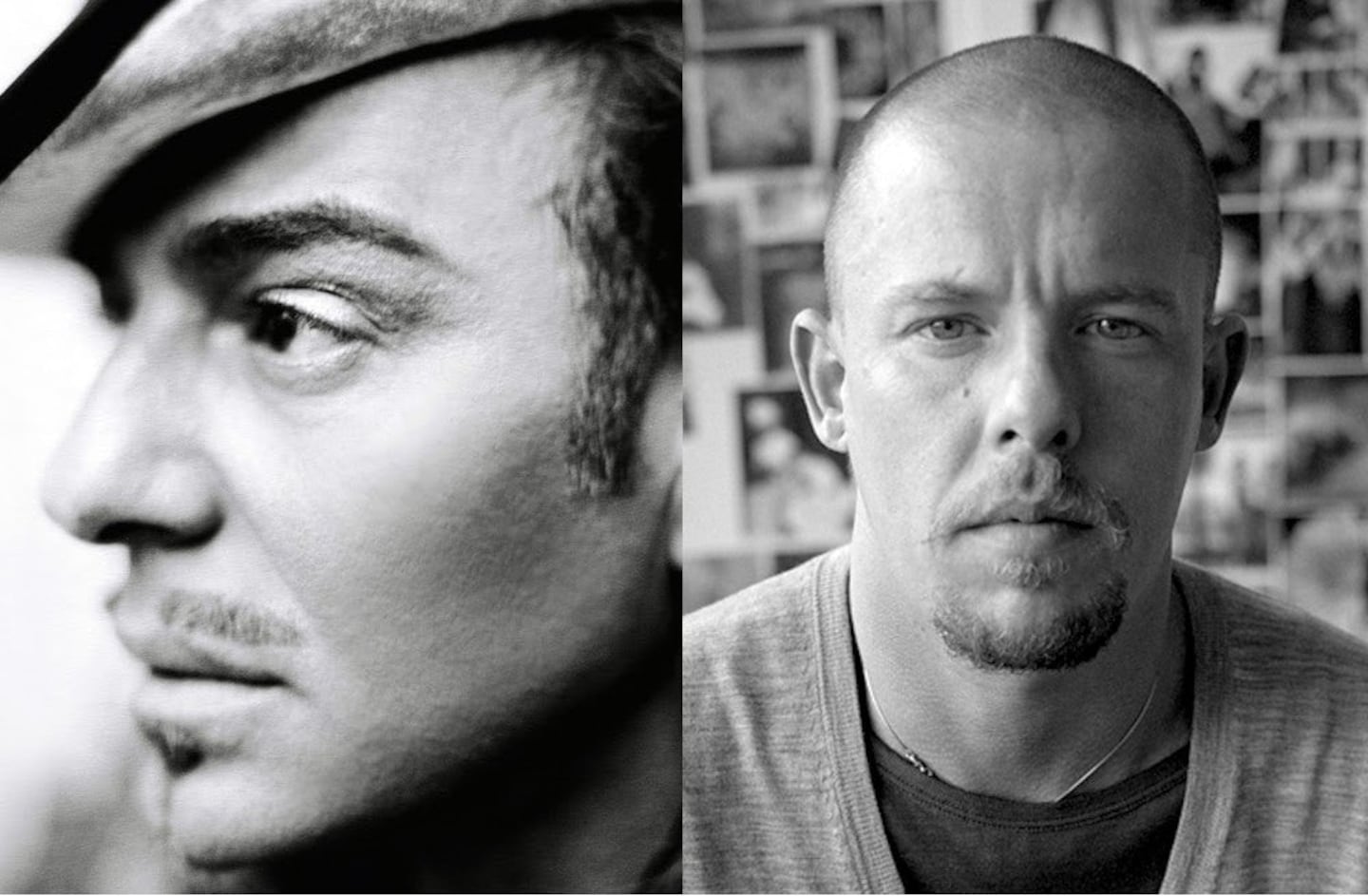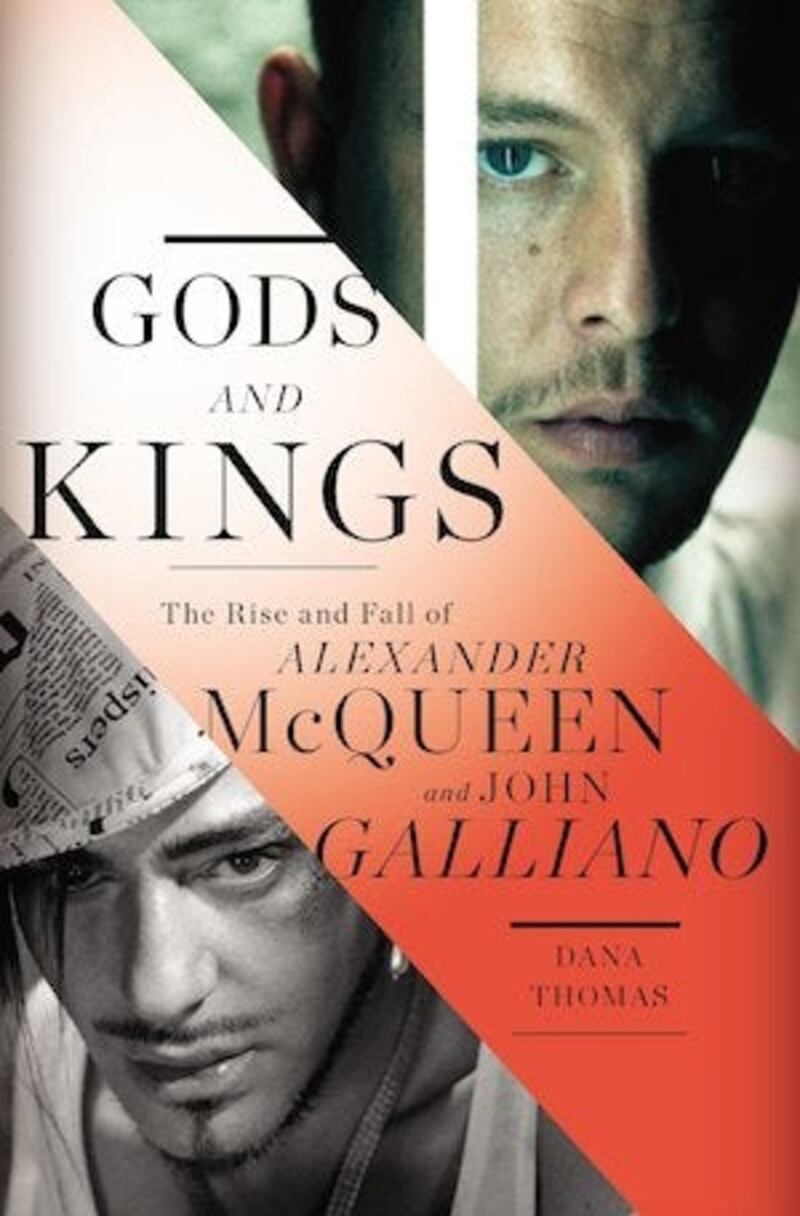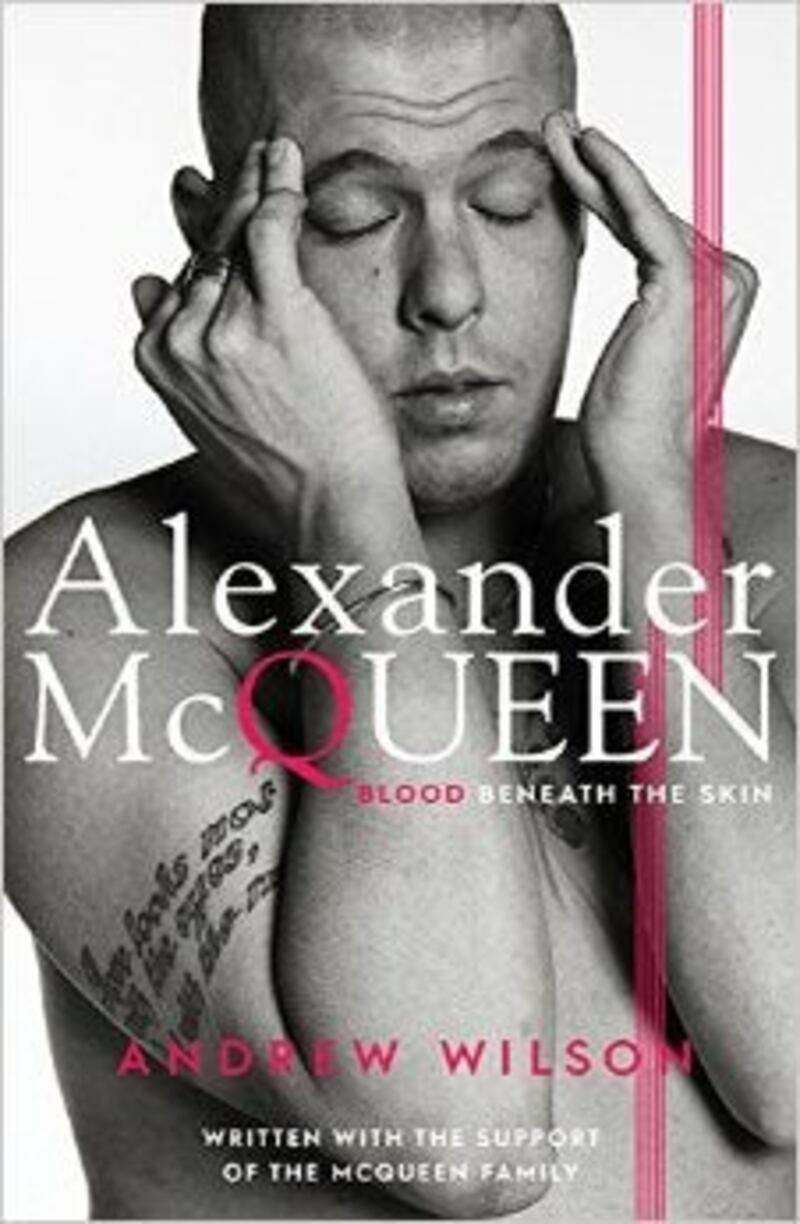
The Business of Fashion
Agenda-setting intelligence, analysis and advice for the global fashion community.

Agenda-setting intelligence, analysis and advice for the global fashion community.

LONDON, United Kingdom — Envisage two talented, middle-aged men, tortured by the demons of success and its dreaded corollary: failure. Both faced psychological and creative crises, which had probably been building for years with no escape in sight. Largely alone, they ultimately found their own solutions: death and drink. We are speaking of the late Alexander McQueen and the disgraced alcoholic, John Galliano. In the case of McQueen, his suicide was, of course, the end of his creative story. In the case of Galliano, the designer has been given a second chance as the creative director of Maison Margiela.
Coinciding with Galliano’s recent return to the catwalk and the restaging, in March, of the “Alexander McQueen: Savage Beauty” exhibition at London’s Victoria and Albert Museum, two books are soon to be released, which attempt to explain the brilliance and failures of the two designers. Neither book is a true biography. Both are opportunistic summaries of selected moments in their subjects’ lives and virtually ignore the creativity that fuelled them. But there the similarity ends.

Gods and Kings: The Rise and Fall of Alexander McQueen and John Galliano by Dana Thomas
Dana Thomas, author of Gods and Kings: The Rise and Fall of Alexander McQueen and John Galliano, is a journalist and her text is largely journalese. Andrew Wilson, author of Alexander McQueen: Blood Beneath the Skin, is a writer and an academic. Despite the melodramatic subtitle, his book goes some way towards engaging the minds — and sympathies — of readers. But I fear it's Thomas' book that will make the bestseller lists and probably be picked up by Hollywood (much of it reads as if a screen adaption is very much in the author's mind), thanks to its slick but rather shallow approach. Wilson's book, though hardly scholarly, is a much deeper affair. He organises his material calmly and cogently, as one would expect of the man who wrote a very good biography of Patricia Highsmith, the writer whose novels Strangers on a Train and The Talented Mr Ripley, have both been successfully turned into films.
ADVERTISEMENT
Wilson knows what he is doing and it shows. As does the fact that he wrote this book with the full co-operation from the McQueen family, whereas Thomas was forced to fill her book with what reads as shallow tittle-tattle from McQueen's ex-lovers, various druggies and the assorted dross of Soho gay bars, lightly salted with clips from the fashion reports of selected international journalists. Indeed, Wilson's book has thoughtfulness and even deep feeling for his subject. There is also a degree of seriousness to Wilson's words, which maintain the impartiality essential to biography. Thomas is clearly much more attracted to the louche, even seedy, side of McQueen's life, including the clubbing, the drugs and the gossip.
Galliano, she sometimes seems to treat with an almost sneering, dismissive tone. Indeed, almost as if she forgot that a good biographer must strive for a balanced argument, Thomas takes a much tougher line with Galliano than with McQueen. In fact, there are moments when one feels that, with John, she is almost hostile to her subject and those around him. She especially vilifies Stephen Robinson, John's right-hand man, who died of a drug overdose. I am not sure what bar-room gossip or jealous atelier junior she listened to, but her words suggesting that he was a bully, fed John drugs and booze and generally contributed to his final collapse, all for his own manipulative ends, seem to me — and I knew Robinson and observed him at work in the fitting rooms — as vicious as they are incorrect. Stephen worked constantly for long hours to help John. To suggest that he would try to undermine him is way off mark. He did what he thought was right to keep his volatile boss (and friend) functioning, if not always successfully. In the end, McQueen's life and tragic death seem to have drawn out Thomas’ sympathies in a way that Galliano's drunken anti-Semitic outburst did not.
To say that I was not a friend of Alexander McQueen's would be stating the truth. He certainly didn't like me. It’s interesting that both writers have quoted his outburst about me, which, many years later, still amuses me. The problem was simple. I believed that Galliano's contribution to dress was much stronger and potentially longer lasting than that of McQueen. And I still do. I never agreed with my colleagues about McQueen's bumsters. To me, the look was nothing more than a cheap trick to shock — McQueen was always good at publicity, including reinventing key moments in his life — and I said what I felt, which, as we know from recent spats between critics and creators, is seldom forgiven or forgotten.

Alexander McQueen: Blood Beneath the Skin by Andrew Wilson
I consider it a great flaw in both books that, due to her untimely death, we are not able to know what Isabella Blow would have said to the authors. After all, once he was established, McQueen liked less and less to hear that Isabella had found and made him, although it was true. He effectively deserted her, forgetting the publicity he gained at the outset of his career when she bought his entire first collection, paying for it as and when she could. But, for the early years of their relationship, they were like Babes in the Woods, little children, supporting, helping and learning from each other. When that relationship cooled, the gifts of clothes to borrow or keep tailed off too, a very short-sighted thing for McQueen to do. Isabella looked marvellous in his tailored suits. When she and I walked around London, it was her hats that attracted the attention. But, in Paris, where I often feel every other person on the street is a fashion expert, it was always the clothes — especially a green leather McQueen suit, which was simply a marvellous piece of cutting — that caught people’s eyes. McQueen's clothes gave a much-needed boost to her delicately balanced self-esteem. She was hurt and humiliated by McQueen’s decision, which, after her suicide, I am sure he would have gladly changed, if he could have.
But returning to the books, Thomas and Wilson have both provided a broader service by explaining so much of the inner worlds of Galliano and McQueen that the general reader will surely come to the end of both books with a heavy sigh for the terrible price we have forced these individuals to pay in the ruthlessly competitive world of high fashion. It is not an accident that the fashion world is known as “Planet Fashion.” It is a sort of parallel universe, with very different rules, attitudes and, indeed, morals. There is only one imperative: to make money each season and to make more the next. The pressure on designers is relentless. Like hamsters, they must peddle faster and faster until all their creativity is spent. As the couturier Cristóbal Balenciaga said when he closed his business, “It is a dog's life,” though, sadly, neither author seriously addresses this.
For those who want to try and understand the emotional and intellectual pressures that bedevil young designers, barely trained for the crucial roles they take on when appointed creative director of a major fashion house, there is a third book which should be read in conjunction with the two under review. Published in 2003, Fashion at the Edge: Spectacle, Modernity and Deathliness, by the highly respected writer and academic Caroline Evans, is a tightly reasoned yet engrossing examination of everything dark and decadent in modern fashion and our collective need to follow the demons that often come with extreme creativity and strike a chord in so many of us. Certainly, a pretty frock is no longer enough. We want the dark side of the avant-garde.
From analysis of the global fashion and beauty industries to career and personal advice, BoF’s founder and CEO, Imran Amed, will be answering your questions on Sunday, February 18, 2024 during London Fashion Week.
The State of Fashion 2024 breaks down the 10 themes that will define the industry in the year ahead.
Imran Amed reviews the most important fashion stories of the year and shares his predictions on what this means for the industry in 2024.
After three days of inspiring talks, guests closed out BoF’s gathering for big thinkers with a black tie gala followed by an intimate performance from Rita Ora — guest starring Billy Porter.